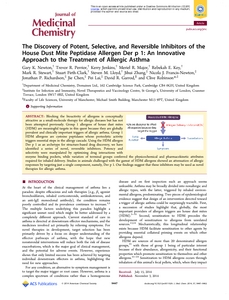Newton, GK;
Perrior, TR;
Jenkins, K;
Major, MR;
Key, RE;
Stewart, MR;
Firth-Clark, S;
Lloyd, SM;
Zhang, J;
Francis-Newton, NJ;
et al.
Newton, GK; Perrior, TR; Jenkins, K; Major, MR; Key, RE; Stewart, MR; Firth-Clark, S; Lloyd, SM; Zhang, J; Francis-Newton, NJ; Richardson, JP; Chen, J; Lai, P; Garrod, DR; Robinson, C
(2014)
The discovery of potent, selective, and reversible inhibitors of the house dust mite peptidase allergen Der p 1: an innovative approach to the treatment of allergic asthma.
Journal of Medicinal Chemistry, 57 (22).
pp. 9447-9462.
ISSN 1520-4804
https://doi.org/10.1021/jm501102h
SGUL Authors: Chen, Jie Robinson, Clive
![[img]](https://openaccess.sgul.ac.uk/107340/1.hassmallThumbnailVersion/The_discovery_of_potent_selective_reversible_inhibitors_house_dust_mites_peptidase.pdf)  Preview |
|
["document_typename_application/pdf; charset=binary" not defined]
Published Version
Download (2MB)
| Preview
|
Abstract
Blocking the bioactivity of allergens is conceptually attractive as a small-molecule therapy for allergic diseases but has not been attempted previously. Group 1 allergens of house dust mites (HDM) are meaningful targets in this quest because they are globally prevalent and clinically important triggers of allergic asthma. Group 1 HDM allergens are cysteine peptidases whose proteolytic activity triggers essential steps in the allergy cascade. Using the HDM allergen Der p 1 as an archetype for structure-based drug discovery, we have identified a series of novel, reversible inhibitors. Potency and selectivity were manipulated by optimizing drug interactions with enzyme binding pockets, while variation of terminal groups conferred the physicochemical and pharmacokinetic attributes required for inhaled delivery. Studies in animals challenged with the gamut of HDM allergens showed an attenuation of allergic responses by targeting just a single component, namely, Der p 1. Our findings suggest that these inhibitors may be used as novel therapies for allergic asthma.
| Item Type: |
Article
|
| Additional Information: |
© 2014 American Chemical Society. This is an open access article published under a Creative Commons Attribution (CC-BY) License, which permits unrestricted use, distribution and reproduction in any medium, provided the author and source are cited. |
| Keywords: |
Administration, Oral, Allergens, Amino Acid Motifs, Animals, Antigens, Dermatophagoides, Arthropod Proteins, Asthma, Chemistry, Pharmaceutical, Cysteine Endopeptidases, Drug Design, Humans, Hypersensitivity, Inhibitory Concentration 50, Molecular Weight, Peptides, Protein Binding, Pyroglyphidae, Medicinal & Biomolecular Chemistry, 0304 Medicinal And Biomolecular Chemistry, 1115 Pharmacology And Pharmaceutical Sciences, 0305 Organic Chemistry |
| SGUL Research Institute / Research Centre: |
Academic Structure > Infection and Immunity Research Institute (INII) |
| Journal or Publication Title: |
Journal of Medicinal Chemistry |
| ISSN: |
1520-4804 |
| Language: |
eng |
| Projects: |
| Project ID | Funder | Funder ID |
|---|
| UNSPECIFIED | Wellcome Trust | UNSPECIFIED |
|
| PubMed ID: |
25365789 |
| Web of Science ID: |
WOS:000345722200016 |
| Dates: |
| Date |
Event |
| 2014-11-26 |
Published |
|
 |
Go to PubMed abstract |
| URI: |
https://openaccess.sgul.ac.uk/id/eprint/107340 |
| Publisher's version: |
https://doi.org/10.1021/jm501102h |
Statistics
Item downloaded times since 27 Feb 2015.
Actions (login required)
 |
Edit Item |



